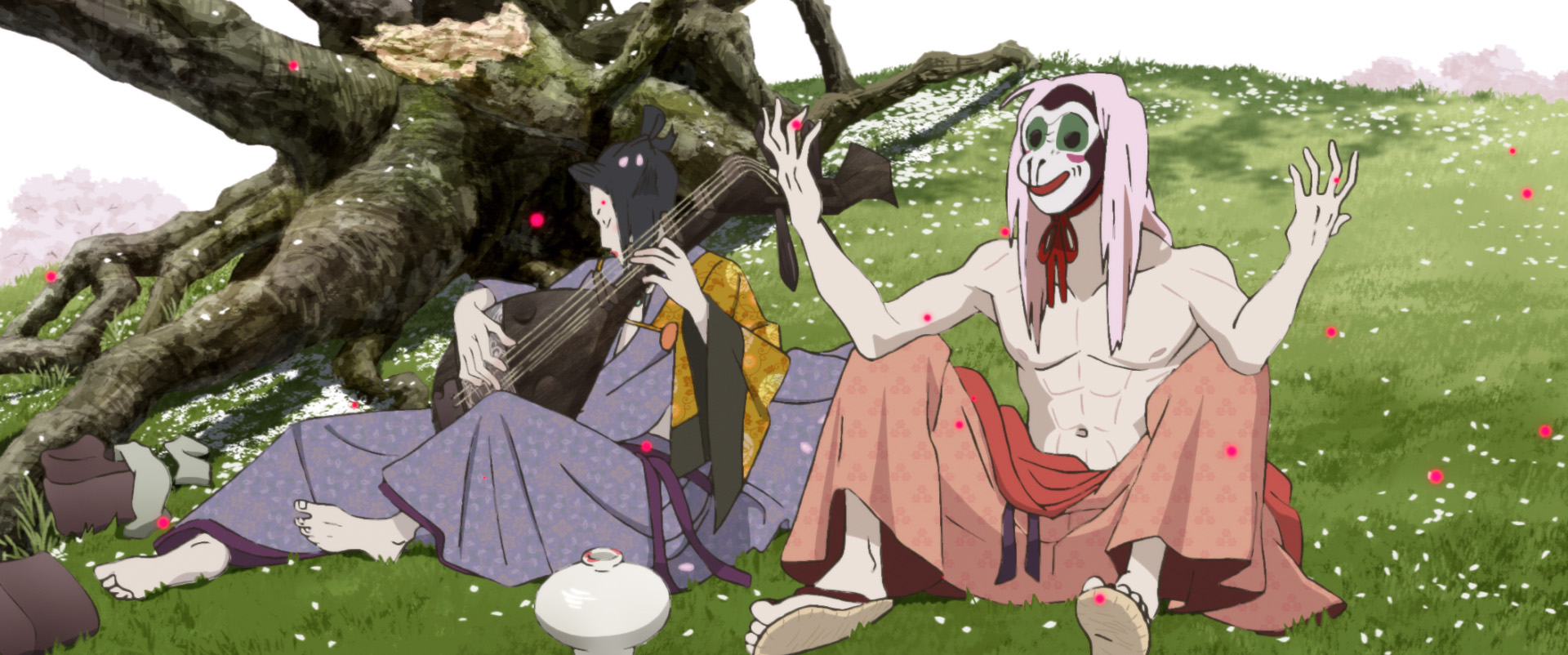This is a review I take very little pleasure in writing. In general, movies that are legitimately trying to do something interesting are movies that end up being rewarded, because they lead somewhere different. Inu-Oh does do something different, but the movie never quite coagulates like I was hoping it would. I haven’t been this let down by an anime film since the disastrous Earwig and the Witch. At least Inu-Oh is better than that film.
900 years ago in Japan, the Genji clan fought the Heike clan at the Battle of Dannoura, where the Genji clan emerged victorious, mostly wiping out the Heike clan in order to unify Kyoto. Hundreds of years later in Dannoura, a young diver named Tomona (Mirai Moriyama) and his father (Yutaka Matsushige) are commissioned by two outsiders to retrieve a box in a shipwreck. They succeed, but something supernatural happens, blinding Tomona and killing his father. Desperate for revenge, an older but blind Tomona goes in search of these outsiders, leading him to famous Japanese historical figures like shogun Ashikaga Yoshimitsu (Tasuku Emoto) and a grotesque strange creature named Inu-Oh (Avu-chan), who desires to perform for the shogun but is ostracized for his strange looks.
Probably half of the running time of Inu-Oh is devoted to these medieval rock operas, intentionally modernizing the music to draw a jarring contrast between Inu-Oh/Tomona’s sound and the sound of the previous generations. While some of the visuals and performances are really impressive, the songs feel like they go on for twice as long as the movie’s runtime. You can drive home the point in 2 minutes, but the songs go on for 5, sometimes 10 full minutes, forcing my hand to fight my instinct to grab my phone because of how bored I eventually became. The longer the songs get, the more the audience checks out, dulling the message and really great points Inu-Oh is trying to make.
Because the storytelling choices and themes are complex and daring. Inu-Oh’s targets are large in scope: they’re going after history and storytelling itself, challenging the very nature of how “established” history comes to become established. This movie could only be made in Japan, because of how important spirits and their co-existence in the real world factor into this plot. That choice gives the movie that special ephemeral anime secret sauce that propels the movie forward. Because the songs clogged the story, they completely cover up the brilliant final 30 minutes, which Inu-Oh the movie weaves a tapestry of complex themes with an unconventional finale. The end really made me sit there an relitigate the truths of the world, lament the probably thousands of famous storytellers forever lost to history, and consider what my choice would be when it comes to breaking the rules or speaking truth to power. None of these questions or answers are easy, but if Inu-Oh had replaced 30 minutes of musical numbers with a more thorough dialogue-laden review of its potent tale, we could have had something really special on our hands.
What’s frustrating about Inu-Oh is I know how special anime can be when everything fits right. Some of the greatest animes, like Princess Mononoke, Your Name, or A Silent Voice are not that far off from Inu-Oh, they’re just more tightly scripted. So Masaaki Yuasa, take some time and talk to Hayao Miyazaki or Makoto Shinkai and figure out how you can better work your next project, because you’re very, very close to being special.

